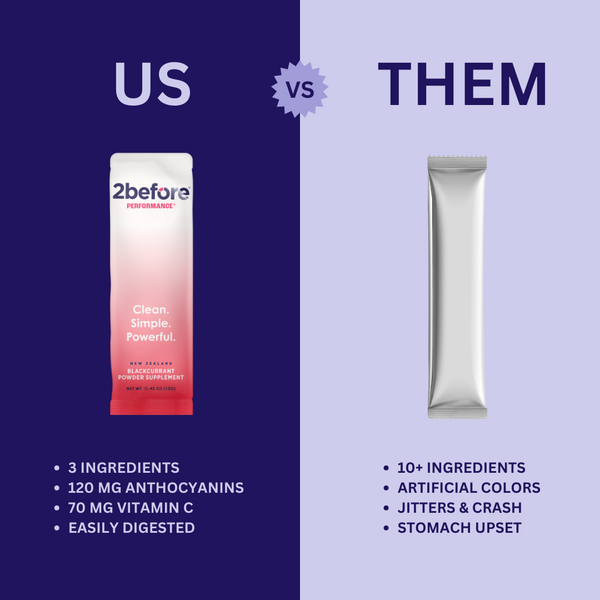The pre workout supplement game is a bit of a minefield.
New products are coming out almost every week claiming to give you an edge in your training and it takes time to figure out which ones are worth your money and which ones aren't worth the powder in their packets.
This can be especially true if you're trying to avoid synthetics in your supplements because you've trying to live a cleaner, healthier life or maybe you've heard synthetic pre-workout products can be harmful or even toxic for your health.
The good news is there are plenty of great options out there that will give you all the energy, endurance and strength boosts without any of the side effects or health concerns!
So what does "natty" mean?
Let's start with the basics. To be "natty" is to use performance-enhancing drugs. What "natty" or natural supplements are is a subject of debate.
- On one hand you have people saying it simply means not having any banned substances. At 2before, we test our products with Informed Sport so you can rely on it being safe for competition.
- Another camp is more extreme, saying nothing artificial, that is, nothing that you wouldn't find in nature. For this group, common pre-workout supplements such as caffeine, creatine and protein powders are all fine.
- If you look even harder, there is a hard-core group that says "Natty" means pretty much anything at all. That's caffeine, sugar. In fact you almost can't eat anythig without falling into a problem with some people.
2before takes a more moderate view.
We think "natty" means simply natural or organic products; things that aren't created synthetically in a lab. And because blackcurrant powder is organic and vegan-friendly, it fits that description.
Shift to natural
The shift to natural has been a long time coming and the benefits of natural products are clear. Let's take a look at the dangers of synthetics and why you should make the switch:
- Because synthetic vitamins are chemically manufactured, they don't have the naturally occurring compounds that make whole food supplements so beneficial, they don’t provide the nutrition quality and quantity that whole food vitamins provide.
- Check the label: They also can contain potentially hazardous compounds such as fillers, dyes, and preservatives that can be harmful to the body.

The benefits of berries
Berries may not be the first thing you think of when it comes to athletic and sports performance, but they should be.
Berries contain high levels of antioxidants (mainly associated with polyphenols, carotenoids, and vitamin C) and have amongst the highest antioxidant capacity of commonly eaten foods.1
These are good for your health, sports performance and recovery, and are (of course) in a 100% natural form.
Synthetic pre workout ingredient watch outs
The big thing to watch out for with synthetic pre workout ingredients is that they're often made in a lab, which can make them less effective, or even dangerous to your health.
One way to think about this is to imagine your ingredients are like puzzle pieces. They're important, but they aren't much use by themselves. The trace minerals, enzymes, and other co-factors that are found in whole foods are like the glue and instructions for the puzzle. They help your body absorb and use the vitamins properly. So, while synthetic vitamins can be helpful, they work best when they come with these "helper molecules" found naturally in whole foods.
Additionally, even though some synthetic ingredients may say they're identical to natural ones, your body might not recognize them as easily. This means they might not get absorbed as well as vitamins from whole foods.
Finally, some products make the claim that they are "all-natural" but they still have artificial flavors, sweeteners, or preservatives.
Natural products and what to expect
We'd always recommend that people get as much of their nutrition as naturally as possible - ideally directly from whole foods.
However, we also know this isn't always convenient or possible. The benefit of a natural pre-workout is that it tries to deliver all of the benefits of a whole food in a convenient and effective manner. For example, each serving of 2before contains the equivalent of 60 New Zealand blackcurrants. Because of the seasonality and transport differences, this would be impossible to consume any other way than as a natural powder.
Of course, natural products are not perfect. Natural substances can contain harmful chemicals and compounds that are just as bad as those found in synthetic ingredients. Additionally, some natural products can cause intestinal or GI issues if you take too much.
Unfortunately, when it comes to efficacy, even looking for something "natural" isn't always enough. No matter how healthy it is to begin with, processing food can strip it of many vital nutrients - leaving it less effective.
The source of a product is also important. For example, blackcurrants grown in New Zealand have been show to be higher in nutrients and antioxidants than blackcurrants grown elsewhere.
What these facts mean is that you shouldn't assume any product is better or worse just because it's made from an organic source or contains no added artificial ingredients, for example.
Natural works with your body not against it
Natural products work with your body, not against it. Natural products are more sustainable. Natural products are better for the environment. Natural products are more ethical, and they’re also better for your health because they come from whole foods.
Try swapping out your synthetics for natural
When you're looking for a new pre-workout product, try swapping out your synthetics for natural. The testing process that goes into manufacturing synthetic products is dangerous, and they often contain harsh chemicals that are bad for the environment and your body. Natural products work with your body rather than against it. They also don't contain any harmful ingredients like parabens or sulphates, both of which have been linked to cancer in humans.
A lot of people are making the switch out of fear, but it's a smart decision in many ways, including health, ethics and sustainability.
A lot of people are making the switch out of fear, but it's a smart decision in many ways, including health, ethics and sustainability.
Natural products are generally safer. They don't contain harsh chemicals or toxins that could potentially harm you or your family. Some synthetic ingredients have been linked to cancer and reproductive issues, like BPA (bisphenol A) found in plastics and phthalates used as additives for fragrances in many personal care products. "Safer" doesn't mean "safe."
However it's misleading to say that natural products aren't always safe; they just tend to be less toxic than their synthetic counterparts. For example: beeswax has antibacterial properties that can help heal wounds if applied topically; however many people are allergic to bee stings so it's important not to use this ingredient if you're allergic!
Natural products are more sustainable than synthetics because they come from renewable resources instead of finite sources such as petroleum-based plastics which require an enormous amount of energy when creating new materials from scratch each time we need them."Sustainable" does not necessarily mean "green",
At 2before, we believe that the future of fitness and bodybuilding is in natural products, but in the end, your choice will come down to personal preference and researching what ingredients would be best for you.
Getting more out of the work you put in
Of course, there's one important thing we haven't mentioned so far.
In a way, taking supplements is the easy part of training.
The hard part is having the work ethic to put in the consistent effort over time that is needed to get the results you are after. No amount of natural supplements and protein powders can replace just going out there and sweating the reps and miles that will make you a better athlete.
So if you're looking to make the switch from synthetics to natty, or looking for something that could help upgrade your workouts, give 2before blackcurrant powder a try.
References:
1. Foito, Alexandre & Mcdougall, Gordon & Stewart, Derek. (2018). Evidence for Health Benefits of Berries. 10.1002/9781119312994.apr0600.



